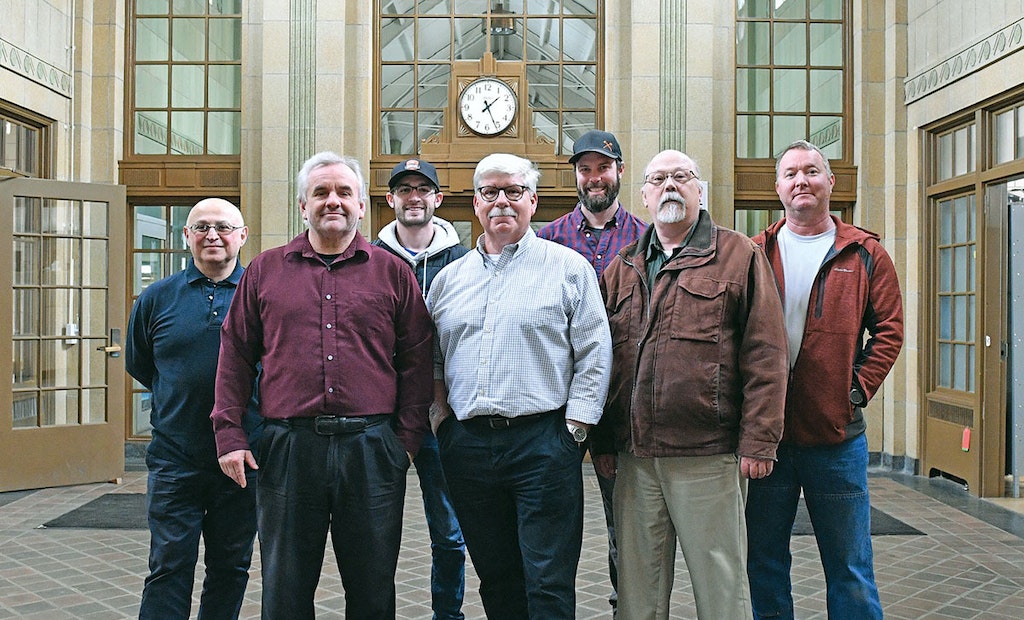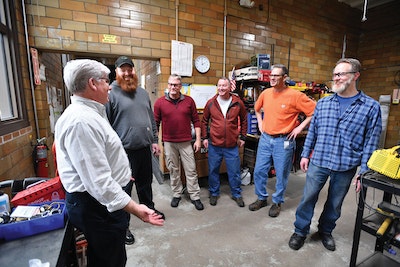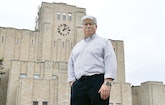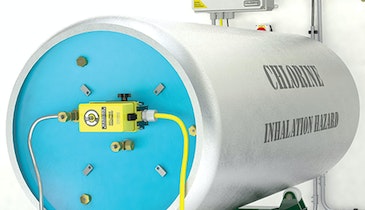
Leading members of the Milwaukee Water Works team include, from left, Theo Rafaelidys, senior water treatment officer in charge; John Bielinski, operations manager; Jacob DeBelak, senior water treatment officer in charge; Daniel Welk, water plant manager; Mike Dwyer, senior water treatment officer in charge; Michael Schaefer, water security manager; and Ryan Dienhart, steamfitter.
Interested in Treatment?
Get Treatment articles, news and videos right in your inbox! Sign up now.
Treatment + Get AlertsDaniel Welk holds two college degrees and a Wisconsin Surface Water Treatment certification.
But a key component of his education in the water treatment sector came through the school of hard knocks. Welk was a chemist with the Milwaukee Water Works at the time of the Cryptosporidium outbreak in spring 1993 that sickened more than 400,000 people.
Welk, now water plants manager with the utility, calls that event a constant reminder of how essential it is for treatment professionals to be vigilant, capable and forward-looking. “These are really important jobs,” he says.
“Sometimes I don’t sleep well. I think of things, and I ponder worst-case scenarios. That leads to asking how I can address the situation. Everybody who works here gets like that. When they see something wrong, they say something. I tell everybody we hire, ‘We all play a role, and we all need to do our jobs right, or else we have negative impacts.’”
Welk assumed his current position in 2010, but has been with the Milwaukee utility since 1986. He oversees the Linnwood Water Treatment Plant (275 mgd), the Howard Avenue Water Treatment Plant (100 mgd), which draws source water from Lake Michigan. He is also responsible for distribution operations (pumping, storage and pressure). Among his achievements is winning a 2022 Meritorious Operator Award from the Wisconsin Section AWWA.
Inspired by studies
After high school Welk studied geology at the University of Wisconsin-Milwaukee but after three years found himself “floundering,” unsure of a career direction. Then he learned about associate degrees available at Milwaukee Area Technical College, paid a visit there, and met with instructors.
“The last group I talked to were the people running the water and wastewater technology program,” he recalls. “I didn’t even know what that was. When they explained it, I was interested. I remember going to the first course and saying, ‘I love this. This is what I want to do for the rest of my life.’”
He graduated from that program in 1984 and two years later took a job at the Linnwood plant as an operator trainee, doing miscellaneous tasks that included washing sludge out of the settling basins with hoses: “I remember on the second day thinking, ‘Why do I need boots that go this high?’ I found out pretty quick.”
Eager to improve his status, Welk took every training opportunity he could find and earned his way onto civil service eligibility lists for a variety of jobs. He worked up the operator ranks, then became a chemist for 10 years and a lead chemist for five years before rising to operations manager at the Linnwood plant in 1999. Along the way he completed his college work, earning a bachelor’s degree in environmental science from Carroll University.
Shock to the system
Welk was a chemist at the Howard Avenue plant when the Cryptosporidium outbreak hit. In fact, he was at home sick with cryptosporidiosis on the day the city issued a boil order. “That really rocked our world,” he recalls. “It was devastating.”
While the precise source of the parasite was never determined, an investigation found that a breakdown in quality control at the Howard Avenue plant had allowed Cryptosporidium cysts to breach the conventional sand-and-gravel filtration process.
After investigating options to prevent future waterborne illnesses, the city opted for ozone treatment (Ozonia North America, a Veolia company) upstream of the coagulation/flocculation basins at both water treatment plants. That $90 million investment at the time represented the largest water plant ozone retrofits in the world, says Welk.
The city also switched to dual-media filtration with sand/gravel and two feet of anthracite, significantly improving performance. In addition, particle counters (Chemtrac units) were added at the outlets of all the filter beds, providing a check on the filters’ effectiveness. The devices count particles larger than 2 microns (Cryptosporidium cysts range from 2 to 5 microns).
“That became a really sensitive tool to monitor overall plant performance,” Welk says. “In the event of any disruption in the process, we would notice it way faster with particle counting than with turbidity measurement.” Finally, the intake for the Howard Avenue plant was relocated farther from shore and in deeper water than the original intake structure. That greatly improved raw water quality.
Moving on up
In another response to the Cryptosporidium outbreak, the utility created a Water Quality Section, of which Welk became a part as a lead chemist. After four years as Linnwood plant operations manager, Welk became plant manager in 2003. When the plant manager at Howard retired in 2010, Welk became manager of a newly formed Plants Section and took on responsibility for both treatment plants.
In that role he led an initiative to optimize the distribution system under the Partnership for Safe Water. “The partnership also has a treatment optimization program to address Cryptosporidium concerns,” Welk says. “We didn’t join it because our leadership believed we were already doing everything at the plants that the partnership was focused on, and more.
“The distribution program, which we joined in 2014, was more meaningful for us. It’s about optimizing chlorine residuals and disinfection byproducts, maintaining adequate pressure, managing main breaks and replacing mains, hydraulic modeling, asset management — essentially everything we do.
“I volunteered to lead the charge to get us through that program. It was a team effort involving all sections of the utility — plants, engineering, water quality, distribution and administration — to conduct a self-assessment. In two years we received the Directors Award, Phase III level, which is the second highest level in the program. Since then, we’ve been using things we developed under the partnership as the basis for future planning: how we can keep making improvements. It’s a never-ending process. We’re also trying to educate and include our employees in that process so it becomes second nature.”
People and machines
Keeping a strong team in place is a persistent challenge. “We have a number of good people, but with the job market the way it is, staffing is really difficult,” says Welk. “When I started here it took four operators and a chemist on each shift to run each plant 24/7. We are now down to two operators on each of six shifts per plant. Operators now do some of what the shift chemists used to perform; collecting grab samples, running basic lab tests and determining dosing for all of the treatment chemicals.”
Automation has helped with that transition: An Automation Section includes staff electricians and other skilled team members who acquired new capabilities, along with a newly hired automation manager, controls engineers and automation technicians.
“We constantly work to upgrade our capability,” Welk says. “Eventually we got to the point where we could completely operate the Howard Avenue plant remotely, from the control room at Linnwood. Both plants use automation features, but many actions are still initiated by operators, such as pump changes, chemical feeds and filter backwashing.
“We have seven pressure districts, and right now we have a dedicated operator who keeps an eye on all that, making pump changes and filling the tanks when needed. All of that could be automated. We haven’t committed the resources yet to get there, but that’s something we’re working toward. We need good operators, but we also need good automation people.”
Retaining team members is a top priority: “The 30-year employee, I don’t know if that is a fair model anymore. And yet you can’t lose focus or give up hope. I always want to get input from our managers and our operators. I try to do everything I can to make this a great place to work.
“We’ve initiated a change management system so that anytime we do something out of the ordinary, we’re going to be thoughtful about it. Everybody talks about it. We plan for the workday scenarios and make sure we have action plans so bad things don’t happen, and if they do, how are we going to respond? We do this as a team. No one person here has all the answers.”
Sometimes the limitations of a public budget cause the wheels to turn slowly in making changes. That calls for patience, raising issues repeatedly with leadership, including proposals in the capital improvement budget and waiting for the timing to be right: “You have to resolve that eventually, if it’s for the betterment of the utility, it will work out.”
Giving back
Welk was honored to receive the Meritorious Operator Award and believes his volunteer service may have contributed. He is vice chair of the Treatment Operations Committee for the Wisconsin AWWA section and helps plan the annual Treatment Operations Seminar. He also has served on the advisory council for Milwaukee Area Technical College water and wastewater program.
“It’s always nice to get recognized, but I didn’t do it for awards,” Welk says. “You do it because you feel you’re making a difference, doing something worthwhile for the citizens of Milwaukee.
“There’s always something new coming up. That’s half the fun of the job. There are always challenges. You always have to think, learn and adapt. People in this profession take a lot of pride in their jobs. We know we have to do things right, all the time. We have operators on duty 24/7 and working on holidays. It’s always a challenge for me: How can I make it a better world for them? Because that’s where I came from.”







